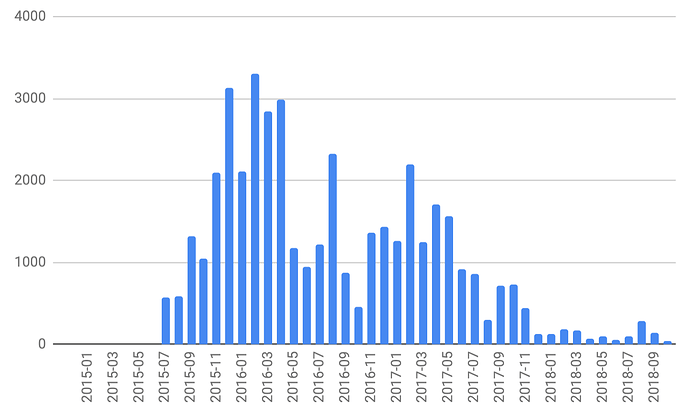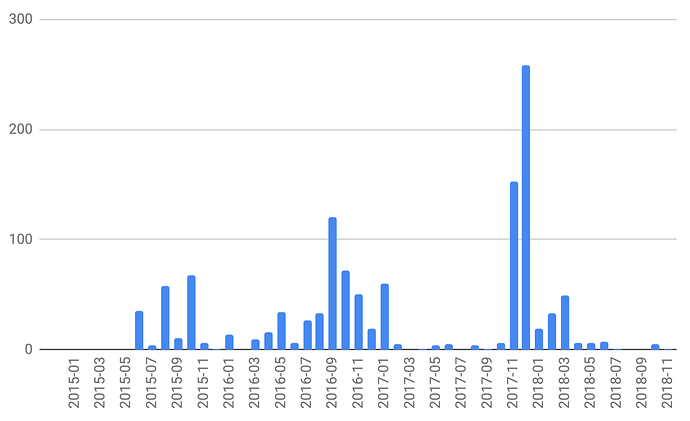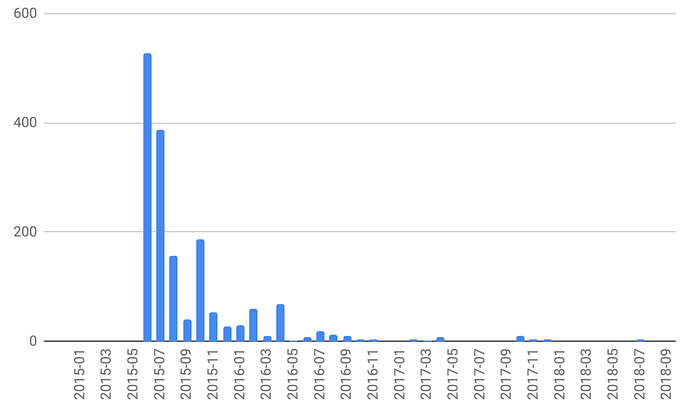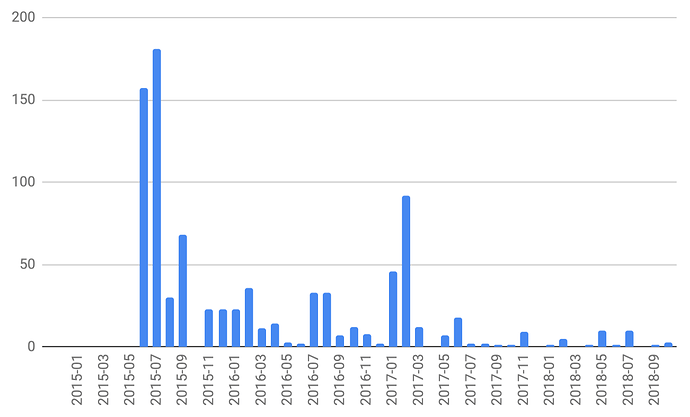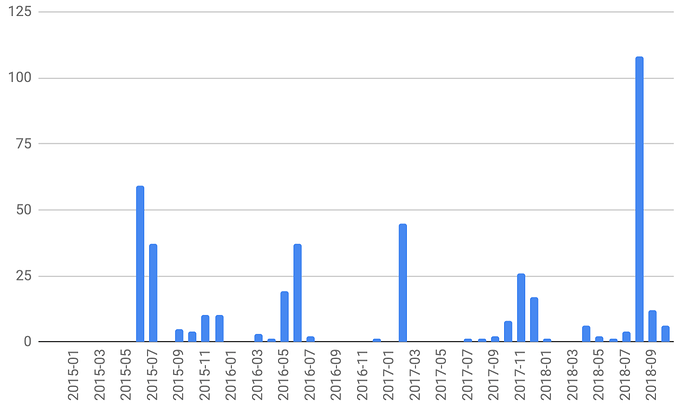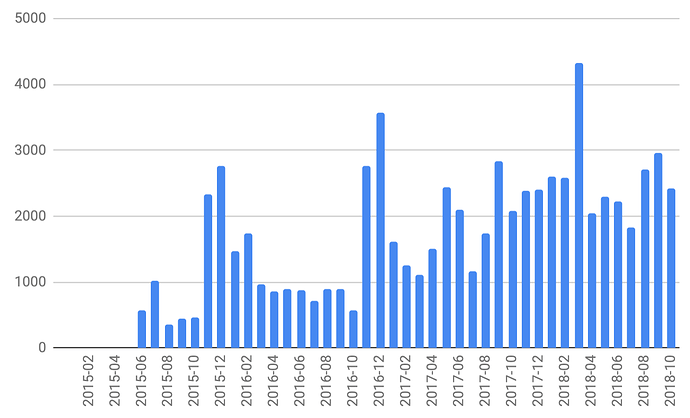Slack is hugely popular within the Clojure community: Clojurians-Slack has ~15k subscribers and there’s a lot of activity in large channels like #clojure, #clojurescript and #beginners (ie ~2k-2,5k messages/month). People with varying expertise meet, exchange ideas and help eachother (newcomers!) out. Slack is a great platform for the community.
local user groups
When looking at the (huge) list of channels we can also see that a lof of local (meetup) groups of the Clojure community decided to have a channel on Slack. There are about 65 of those channels (named clojure-<country|city>).
With Slack being ubiquitous, and even newcomers know their way to Clojurians-Slack, one would expect these channels to be vibrant as well, right? Promoting the upcoming meetup, deciding on topics to discuss, talking about the last presentations etc.
Let’s look at some numbers.
- roughly most of these channels were started around the same time: May-Aug 2015
- they have a significant amount of subscribers (the top-12 all having > 100 subscribers, the top-3 > 220)
Apparently, there was a huge demand for chat-like conversations in these smaller communities.
Fast-forward 3,5 years. How are the conversations going?
Let’s take a look at the largest channel: clojure-russia, 555 subscribers, started when Slack was introduced (May 2015).
Below the number of messages/month from summer 2015 till Oct 2018:
While 3000 messages were sent end 2015/beginning 2016, there’s only a 150 messages being exchanged these days.
Let’s go to number 3 (in subscribers count): clojure-brasil, 219 subscribers, also started Summer 2015:
Seemed to have had their heydays in Q3 2016. These days: nothing.
Onto the next: number 4, 5 and 6 (again, in subscribers count): resp. clojure-japan, clojure-berlin and clojure-germany:
Not sure about Clojure in Japan, but as for Germany, it does not seem to represent the vibe I got when visiting ClojureD and Clojure-meetups in Berlin.
a typical conversation starter for many of the channels…

altogether now
The top-40^1:
| channel | since | subscribers | msg/month^2 | trend^3 |
|---|---|---|---|---|
| clojure-russia | May 2015 | 555 | 156 | :downwards_trend: |
| clojure-uk | Jun 2015 | 369 | 1866 |  |
| clojure-brasil | Jun 2015 | 219 | 1 |  |
| clojure-japan | May 2015 | 169 | 0 |  |
| clojure-berlin | Jun 2015 | 162 | 2 |  |
| clojure-germany | May 2015 | 157 | 12 |  |
| clojure-india | June 2015 | 133 | 0 |  |
| clojure-nl | May 2015 | 118 | 158 |  |
| clojure-france | May 2015 | 116 | 0 |  |
| clojure-canada | July 2015 | 108 | 2 |  |
| clojure-europe | July 2015 | 107 | no data | no data |
| clojure-poland | June 2015 | 103 | 0 |  |
| clojure-finland | June 2015 | 97 | 1 |  |
| clojure-sanfrancisco | Jan 2016 | 97 | 3 |  |
| clojure-ukraine | Jun 2015 | 90 | 1 |  |
| clojure-australia | Jun 2015 | 86 | 0 |  |
| clojure-sweden | May 2015 | 86 | 3 |  |
| clojure-china | June 2015 | 82 | 0 |  |
| clojure-sg | May 2015 | 80 | 0 |  |
| clojure-chicago | Aug 2015 | 75 | 0 |  |
| clojure-czech | June 2015 | 71 | 0 |  |
| clojure-italy | Jun 2015 | 70 | 242 |  |
| clojure-norway | Jun 2015 | 68 | 0 |  |
| clojure-boston | Sept 2015 | 64 | 1 |  |
| clojure-spain | May 2015 | 64 | 0 |  |
| clojure-austin | July 2015 | 62 | 15 |  |
| clojure-ireland | Jan 2016 | 61 | 0 |  |
| clojure-korea | June 2015 | 57 | 0 |  |
| clojure-losangeles | Nov 2016 | 50 | 6 |  |
| clojure-switzerland | Aug 2015 | 48 | 0 |  |
| clojure-argentina | Aug 2015 | 45 | 0 |  |
| clojure-seattle | June 2015 | 45 | 0 |  |
| clojure-tokyo | Feb 2017 | 41 | no data | no data |
| clojure-greece | June 2015 | 38 | 0 |  |
| clojure-belgium | Feb 2016 | 38 | 0 |  |
| clojure-miami | Aug 2015 | 36 | 0 |  |
| clojure-hamburg | July 2015 | 35 | 0 |  |
| clojure-hk | July 2015 | 34 | 0 |  |
| clojure-taiwan | Nov 2015 | 33 | 0 |  |
| clojure-portugal | Jan 2016 | 32 | 0 |  |
[^1]: data from https://clojurians-log.clojureverse.org
[^2]: median of last 3 months
[^3]:  channel is practically abandoned
channel is practically abandoned
let’s talk chat
So most subcommunities got off Clojurians-Slack. Did Slack become less popular?, or Clojure as language? I think quite the opposite (for both).
What I think is at play is the type of conversation you want to have - and that the numbers show how suited Clojurians-Slack is for some converstions, and not for others.
question&answer
If you look at a channel like #clojure or #beginners then you see there’s mostly a technical question-answer flow: What to use? How to do X? Why Y? Code snippets flying.
The conversation is mostly synchronous: a question being unanswered in the course of an hour is most likely never to be answered; no problem, just try again later. Given the unstructured form of discussion (and high volume) catching up is hard. The limited history (~6 days) is not perse a problem: sure, searching is not possible, and hence, similar questions are asked all the time, but everyone knows the deal.
#beginners 
local communities
Compare this to typical conversations in meetup-channels: people chit-chatting with people they know from meetups, talk about interesting topics, who will be presenting the next meetup etc. People here are interested in Clojure (language or concepts) but not necessarily using it professionally.
A typical subscriber checks in with the community less often (a meeting is once a month) and catching up with the conversations is important for these users. Given the limited history and unstructured format of chats on Clojurians-Slack it’s partly impossible to see what I missed, nor is it convenient to catch up.
Especially to get the community going you want as much (structured/skimmable) history as possible. Seeing an empty channel instead is the ‘empty restaurant’ equivalent for online communities.
Conclusion: this user needs a more asynchronous way of conversation. Having limited options to hook into conversations (even if that’s 2 weeks ago) makes ‘making conversation’ (for individuals) and building social fabric (as a group) really hard.
what about small opensource-projects?
As compiling the data for the local groups was easy due to the naming convention. But I can imagine the asynchronous nature of conversations is also preferred by authors and users of small opensource projects.
Pointing users somewhere where answers can be found that you or others gave earlier is a huge plus - as you’re probably not yet having a channel filled with users that can help out. Again, asynchronous is key.
chat like it’s 2015
This is a bit of digital archeology and speculation but I can think of a reason why Clojurians-Slack did once work for low-traffic channels: messages stayed up longer.
As Clojure/Script became more popular, so did the amount of “question-answer” messages. As a result the “sliding-window” of visible messages shrunk. So while messages today are only shown for 6 days, it’s been probably significant more than that.
Conclusion
Smaller communities within the Clojure community that once had an online presence on Clojurians-Slack, have moved off the platform. Clojurians-Slack is not the problem: it’s more lively than ever - but for question/answer type of conversations.
As a lot of later-to-be-Clojure-devs start in a local community I think it’s a loss for the greater community to no longer have these communities ‘near’ and offer them a place to talk Clojure.
I’m curious about the thoughts from the community here.
Also: stay tuned for my next post. Because we started something new…
